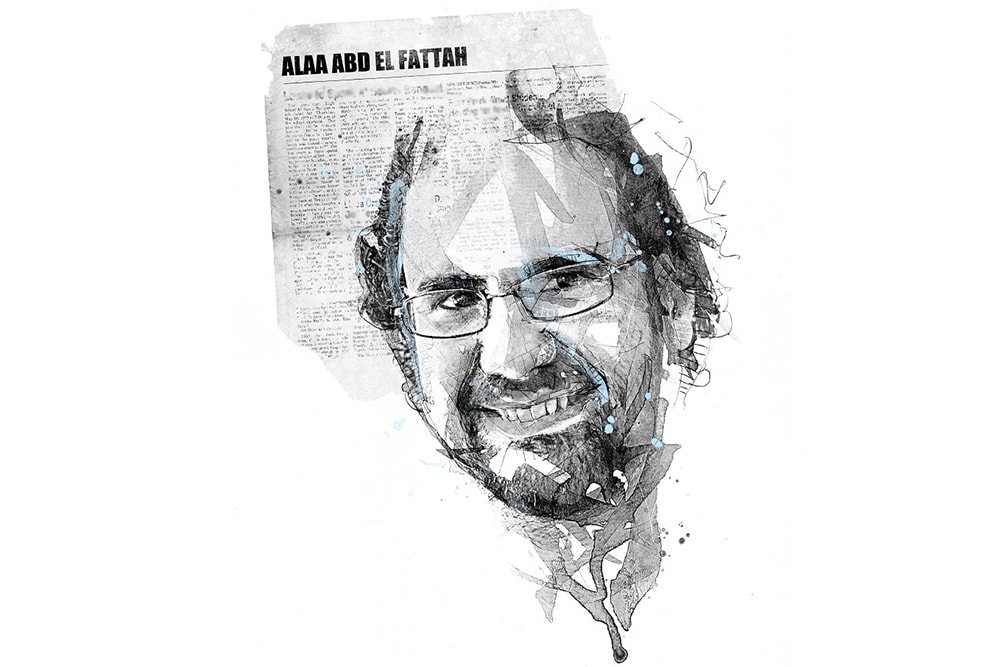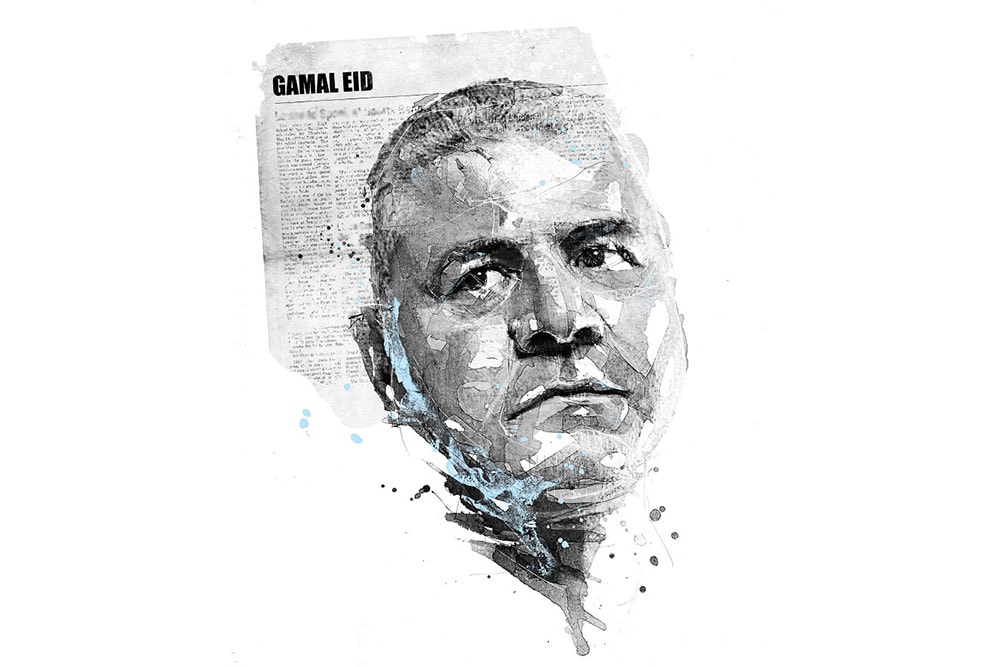Social media was one of the driving forces behind the 2011 Egyptian revolution. Yet today, one of the country's most renowned bloggers, software designers and digital revolutionaries still remains behind bars.
In an interview with Democracy Now in March 2014, Alaa Abd El Fattah said: If what you're trying to do is to achieve a life of dignity and safety and prosperity for yourself and for your loved ones, then you have no choice [but to carry on the struggle].
From the early 2000s, Abd El Fattah has been at the cutting edge of digital technology, developing platforms and programs to enable Egyptians greater access to the Internet, and facilitating networks of Middle East technologists. He and his wife at the time, Manal Hassan, have been commended for their groundbreaking websites providing what the Electronic Frontiers Foundation describes as an archive of dissent in the face of repression. Their site, Manal and Alaa’s Bit Bucket manalaa.net, provided free storage and advice to bloggers. In 2005 it earned the Deutsch Welle/Reporters Without Borders Weblog award for being “crucial in developing a critical and engaged blogger scene in Egypt and the Arabic-speaking world.” Another of their sites, Omraneya, that collected blogs from across the region, is described as a ‘house of alternative expression and … the amplifier of muted voices’.
Abd El Fattah’s first detention was in 2006, when he was among a number of others who were arrested when they protested for an independent judiciary during former President Hosni Mubarak’s regime. He was released after 45 days. His imprisonment sparked the Free Alaa website which today has evolved into the twitter hashtag #FreeAlaa.
Imprisonment did nothing to quash Abd El Fattah’s activism. In 2011 he became one of the public faces of the democracy movement, developing on-line platforms that enabled citizens to be involved in the drafting of the Egyptian Constitution. His tweet symposiums (tweet-nadwas) brought together people at the heart of the revolution to debate issues ranging from Islamism to economic reform, filmed to illustrate “the effort and friendly spirit that exists in these conversations”.
By the end of 2011, the euphoria of the revolution that had led to Mubarak’s resignation had turned sour. In October that year, Abd El Fattah was arrested for his coverage of clashes between Coptic Christian protestors and troops during which 27 people died and 100s were injured. He was released two months later.
Then, in November 2013 a law banning demonstrations was put in place. A few days later, Abd El Fattah was arrested again, and although he had not been at the protests, he was accused of being an organiser. He was bailed four months later, only to be re-detained in June 2014 when he was handed down a 15-year sentence in absentia – he and fellow defendants were not allowed into the court room. He was once again released on bail in September 2014, but ordered back into jail the next month. After trial hearings that were postponed several times and a stint in the hospital after going on hunger strike, he was sentenced to five years in prison in February 2015.
On 30 December 2017, Abd El Fattah was sentenced in a separate trial, along with 23 other defendants, wherein he was charged with “insulting the judiciary” based on a tweet he had published in 2013. While 20 of the defendants were sentenced to three years in jail, Abd El Fattah was ordered to pay a fine of 30,000 Egyptian pounds (approx. US$17,000).
In March 2019, Abd El Fattah was released on probation. As part of the probation conditions, he was forced to spend 12 hours every night in El-Dokki police station. However, even this state of quasi-freedom did not last long. Six months later, during a crackdown on dissidents in September 2019, Abd El Fattah was detained once again on the morning of 29 September after leaving the police station where he had spent the night. Escorted to the maximum security wing of the notorious Tora Prison, he received a “welcome parade” upon his arrival – a well-established practice of humiliating and beating specific prisoners, which Abd El Fattah had described in an essay only days earlier.
Abd El Fattah was initially charged with joining a terrorist group, spreading false news leading to a disturbance in public security, and misusing a social media platform to broadcast and spread false news. Enduring dehumanizing prison conditions, including being denied access to books and regular communication with family, the writer and activist launched a hunger strike in April 2020 to protest his unjust detention.
In September 2021, Abd El Fattah’s family and lawyer raised concerns over the activist’s mental health after his pretrial detention surpassed the two-year maximum legal limit. The following month, Abd El Fattah finally appeared for his first trial session at the Emergency State Security Misdemeanor Court, where he discovered he was facing charges of publishing false news under a new case that includes blogger Mohamed Ibrahim and human rights lawyer Mohamed al-Baqer. The charge against Abd El Fattah centers on his re-sharing of a tweet about a prisoner’s death as a result of ill treatment during his detention in Tora Prison in 2019.
“The prosecution hasn’t questioned me about anything in my case for 23 months, and after 23 months, I find out that I am being accused of sharing a news item,” Abd El Fattah reportedly told the judge.
In December 2021, Abd El Fattah was handed a five-year prison sentence by the emergency court, alongside Mohamed El-Baqer and Mohamed Ibrahim, each of whom received four-year sentences. Despite condemnations by rights groups that called on Egypt’s President Abdel Fattah al-Sisi to cancel the verdict, the sentences were upheld in January 2022 and are not subject to appeal. The activists also learned the two years they spent in pre-trial detention would not be deducted from the sentences as they were sentenced under the new case, meaning Abd El Fattah would be released in January 2027.
In April 2022, the activist was granted British citizenship through his mother, renowned academic Laila Soueif, who was born in London. Civil society organisations have since pressed the UK Foreign Office to uphold his rights as a British-Egyptian citizen and act to secure his release.
In the same month, Abd El Fattah launched an open-ended hunger strike protesting his unjust detention. His health deteriorated dramatically in the months that followed as he survived on a diet of only 100 calories per day in the form of a spoon of honey and a drop of milk in tea.
By November 2022, Abd El Fattah’s partial hunger strike had lasted more than 200 days. Despite being in poor health, the activist went on a full hunger strike in a final bid for freedom as Egypt prepared to host the UN climate summit, COP27, in Sharm El-Sheikh that month.
In a letter to his family declaring the escalation of his hunger strike, Abd El Fattah wrote:
“If one wished for death then a hunger strike would not be a struggle. If one were only holding onto life out of instinct then what’s the point of a strike? If you’re postponing death only out of shame at your mother’s tears then you’re decreasing the chances of victory… I’ve taken a decision to escalate at a time I see as fitting for my struggle for my freedom and the freedom of prisoners of a conflict they’ve no part in, or they’re trying to exit from; for the victims of a regime that’s unable to handle its crises except with oppression, unable to reproduce itself except through incarceration.”
A History of Activism
You Have Not Yet Been Defeated, a collection of Abd El Fattah’s translated writings, was released in October 2021 by independent publisher Fitzcarraldo Editions, which describes the writer as ‘a fiercely independent thinker who fuses politics and technology in powerful prose’. Beginning with the 2011 protests in Tahrir Square, the book chronicles a turbulent era, and features writings smuggled out of prison and translated by an anonymous collective.
Abd El Fattah’s family has stellar human rights credentials. His father, Ahmed Seif el-Islam, was a leading human rights lawyer who spent time in prison. His mother, Laila Soueif, a professor of mathematics, and sisters Mona and Sanaa Seif, are also dissidents and leading lights in the 2011 Tahrir Square demonstrations. His grandmother, writer Fatma Moussa headed PEN International’s Egypt Centre, and his aunt, Ahdaf Soueif, is a well known writer and activist.
Sanaa Seif spent over a year in prison until her release under a political amnesty in September 2015, only to serve another two years behind bars on spurious charges of “spreading false news”, “misusing social media,” and insulting a police officer after being detained in June 2020. Seif was released in December 2021, days after her brother’s sentence was handed down.
The power of the written word runs deep in Abd El Fattah’s heritage and activism. When brought before the State Security Prosecution in December 2019, he spoke of the deprivations he has endured in prison, including hot water, exposure to sunlight, and a bed. Yet, most vital to him was the denial of books and newspapers, which were his sole request from the prosecution, saying: “We need to restore the importance of words and the right to the written word; they do not represent a threat to society but rather are a necessary part of its development and progress.”
Illustration by Florian Nicolle
There is a Change.org petition calling for Alaa Abd el Fattah’s release. You can read and sign the petition here.


